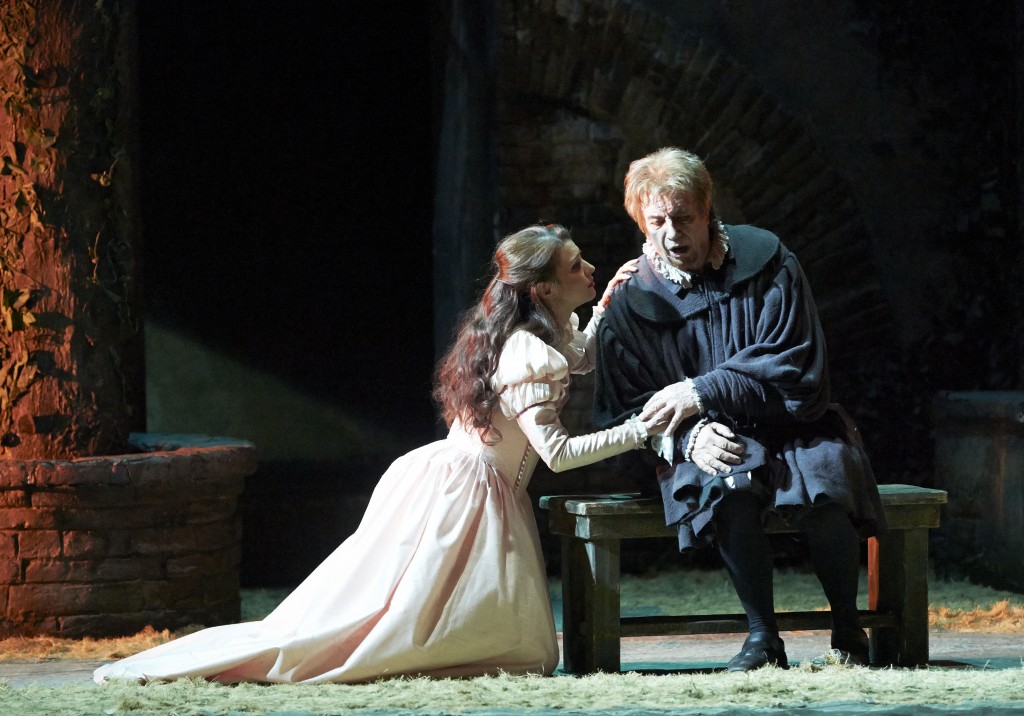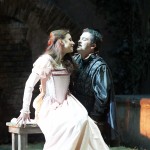 Vienna State Opera’s spectacular period production Rigoletto (stage Pantelis Dessylas) opens in the Duke’s palace. The banqueting hall where the Duke is entertaining his Court has rich oak panelling; the costumes, late Renaissance, appear authentic. So Verdi’s plot is dramatically more plausible than those modern stagings using the Court as a Mafia analogy.
Vienna State Opera’s spectacular period production Rigoletto (stage Pantelis Dessylas) opens in the Duke’s palace. The banqueting hall where the Duke is entertaining his Court has rich oak panelling; the costumes, late Renaissance, appear authentic. So Verdi’s plot is dramatically more plausible than those modern stagings using the Court as a Mafia analogy.
The opening scene sets in motion the tragedy. The Duke (Piero Pretti) sings boasting, he finds pleasure today, he may be with another tomorrow. And without scruples, proceeds to woo the beautiful wife of Ceprano, his loyal retainer. Pretti, well named, has an irrestibly mellifluous tenor. We’re in no doubt about his lechery, but he’s charming.
Rigoletto role is that of court jester -a Shakesperean Fool- aiding and abetting his Duke, and mocking his courtiers. But he’s victim of his own intigues. Rigoletto’s tragedy is inherent within the characteristically Verdian relationship between over-possessive father and daughter seeking independence and love.
Leo Nucci’s Rigoleto, short, red-haired, appears slightly stooped, in fact a hunchback. And he’s actually wearing a harlequin outfit. Nucci is an operatic legend, celebrating his 500th stage appearance (4th April 2014) and 35 years performing at Vienna State Opera. His Rigoletto is a special treat for opera lovers. His distinguished baritone has enormous timbre, and he inhabits the role with subtle characterisation. Nucci holds the stage firing his caustically witty ripostes.
But the tragedy is sealed by Count Monterone’s outburst, demanding an explanation of the Duke who’s dishonoured his daughter. Rigoletto scorns the slighted father. Monterone curses both master and servant, but it’s Rigoletto who is haunted by the curse.
Act 2 , returning home, Rigoletto is accosted by Sparafucile, a professional assassin, (in whom Rigoletto sees a reflection of his own life.) Rigoletto’s aria -deeply troubled by the curse- is a highpoint of the opera. It reveals insights into his complex nature, the demon that drives him. To cellos and double basses- unsettled, disturbing- Nucci sings movingly, we are all alone. Rigoletto compares himself to Sparafucile: Sparafucile murders with his dagger, he uses words. He repeatedly sings , mantra-like, the old man put a curse on him . Now echoing Shakespeare’s anti-heros- Richard III , Iago- sings Nature has made him vile. How terrible it is to be crippled. But he may not weep. His young, handsome master orders him ‘Make me laugh’. If he, Rigoletto, is evil, it is because of him.
But here-(at home) -he becomes another man. Now upbeat orchestral strings: his daughter Gilda appears. His love for her humanises him. Gilda (Valentina Nafornita, a charming brunette ), complains she ony ever goes to church. – ‘Don’t remind a man of the happiness he’s lost’. His wife died. Only she is left to him, his mercy.-‘But what grief,’rejoins Gilda, ‘Calm yourself father.’-‘Only you are left to me.’ In a powerful interaction between Nucci and Nafornita, Rigoletto, Verdi’s obsessive father, ‘You are my family, country, universe.’ She’s been there three months, hasn’t seen the town. ‘Is the door locked?’ – ‘Always. Your precious flower will never be broken.’ . (Rigoletto instructs the housekeeper, Giovanna, she needs to be vigilant.)
Gilda confides in Giovanna (Juliette Mars), she’s been seeing a young man in church, (‘a student’). He’s generous, and refined. She doesn’t want a nobleman; she’d love him all the same.
 ‘Say those sweet words again!’ The Duke (disguised) has insinuated his way in. Pretti’s tenor is melting, melodious. ‘She is the sunshine of his soul’. Physically, Pretti is short and slight in relation to Nafornita, who’s seated on the garden bench, he standing over her. Their duet is well delivered. Their voices melt; she coos along. (The Duke is shameless, such is the power of rhetoric!)
‘Say those sweet words again!’ The Duke (disguised) has insinuated his way in. Pretti’s tenor is melting, melodious. ‘She is the sunshine of his soul’. Physically, Pretti is short and slight in relation to Nafornita, who’s seated on the garden bench, he standing over her. Their duet is well delivered. Their voices melt; she coos along. (The Duke is shameless, such is the power of rhetoric!)
In Gilda’s aria , Let his name be engraved on my heart, Nafornita is accompanied by a flute solo: jaunty rhythms introduce the well-known Caro nome, ‘Beloved name, may you always remind me of love…’ Nafornita’s display of coloratura is pleasing , but (standing left of stage by a well) she sounded a little shaky at one point. (She was unwell.) Elsewhere, Nafornita’s gorgeous stage presence and acting compensated.
We see the sumptuous palace interior; tables strewn with chess sets. Pretti sings angelically, he’s overcome by her virtue. And sententiously, she has been stolen from him. (The Duke’s courtiers have abducted the secreted-away Gilda, believing her Rigoletto’s mistress). With saintly indignation, he sees her tears as she calls to ‘her beloved Gualtier’ (his disguise). Terrifically sung by Pretti in a rich red velour house coat: the devil has all the best tunes.
Chorus- Vienna State Opera’s excel in Verdi- sing, ‘He has discovered a rare beauty’. In one of the great Verdian choruses- ‘They carried her out…blind-folded the girl.’ They actually sound quite charming. Verdi gives them a jaunty swagger, mocking their false bravado. The Duke sings of the poor girl: love summons him (Possente amor) . Chorus repeat (ironically), why is he so agitated.
Nucci’s scene, searching for Gilda (end Act 2) is harrowingly well played. They mock him, ‘Poor Rigoletto! What’s new, jester?’ They taunt him- Where can she be?-Verdi’s strings sardonic, almost laughing, jeering. Nucci, hunch-backed, is pitiful in his jester’s costume. In his aria -The girl you abducted last night is my daughter- their contempt changes to embarrassed silence. Rigoletto begs for pity; he can only weep. He pleads, have a heart. Then, a long sustained note, ‘You are fathers…’, accompanied by a superbly played cello solo. It was powerfully rendered. The applause for Nucci went on and on.
Gilda is brought in. Distraught, shamed. She’s been deceived, but confesses her love. Rigoletto sings, have no fear my angel. We are alone, speak. Gilda admits she saw the young man every sunday in church. She said nothing, but their eyes spoke. He came to her secretly yesterday, then left. But she ‘was filled with hope.’
Nucci sings poignantly, he hoped she would rise up as high as he, Rigoletto, has fallen. Weep my child to my heart! He swears to avenge the honour of fathers. Terrible vengeance is his one desire. The jester will strike him down. (The Duke sings, side of stage, he suspects me.) The scene ends tremendously, Verdi’s conflicting voices in ensemble.
Opening Act 3, an imposing rocky stone building (the Tavern). Maddalena (Nadia Krasteva) salaciously tempts the Duke. ‘All moral sense vanishes in the act of love.’ There is no doubt of his deception of Gilda. The Duke is incorrigible: ‘Come here and hear his heart beating.’ She is leading him on- dangling her legs- all thighs. Krasteva’s mezzo is excellent!
Now the Duke’s iconic aria La donna e mobile… ‘Woman is as wayward as a feather in the wind. Her pretty face is deceitful, whether weeping or sleeping.’ It’s insolent, bragadaccio, misogynistic; and accented by a soaring clarinet solo. Outside they’re overheard by Rigoletto and a despairing Gilda. He’s given Gilda time to get over him. Would she still love him if he were deceiving her? Besotted, she continues to love him. (Later Rigoletto negotiates with Sparafucile: Kill him and he’ll double the reward.) Again we hear the Duke’s swansong. Cruel misogyny! Pretti, in a grey swashbuckling outfit: Lamentable the man who puts his trust in a woman! But it is superbly sung, reaching thrilling high notes. Well applauded.
For Rigoletto the moment of vengeance is here at last. (A storm brewing, a sack is delivered.) ‘Take a look at me, the jester. Now he is at my feet!’ Then he hears the Duke’s refrain, as if mocking him, from the balcony, (La Donna e mobile), so beautifully sung by Pretti. Insidiously alluring, satanic?
So who’s in the sack instead? Impossible! She left for Verona. We hear Nafornita, her voice feeble. She deceived her father. She loved him too much; disguised to save the Duke, must die for him. Crushed, Rigoletto, declaims, ‘Oh terrible God!’ She has been struck down by revenge. Pathetically, if she goes, he’ll be left alone. The sheer abjection of human despair- man juggled by fate- is akin to the desperately pitiful King Lear picking up his smitten daughter Cordelia. In Verdi, fusing music with high drama, the scene cannot fail to move.
Nafornita performed in spite of illness: against the towering performance of Nucci, and Pretti’s virtuoso tenor. Jesus- Lopez Cobos, distinguished in Italian repertoire, encouraged Vienna State Opera orchestra to their Verdian best. And that glorious Chorus! P.R. 4.4.2014
Photos: Valentina Nafornita (Gilda) and Leo Nucci (Rigoletto); Valentina Nafornita and Piero Pretti (The Duke of Mantua); Featured image Piero Pretti (the Duke)
(c) Wiener Staatsoper/ Michael Poehn
viennaoperareview.com
Vienna's English opera blog
